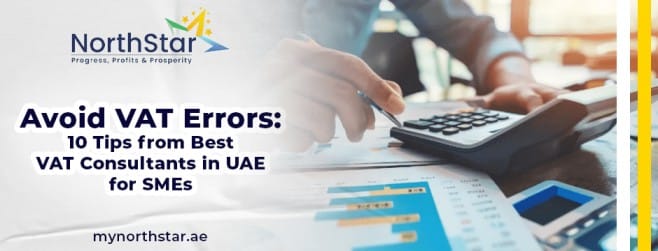
Avoid VAT Errors: 10 Tips from Best VAT Consultants in UAE for SMEs
Navigating VAT in the UAE is essential for keeping your business on the right side of the law—and the ledger. Ever since VAT was introduced, many small and medium businesses have found it tough to fully understand and keep up with the rules. It is easy to make errors when dealing with VAT, which may result in fines, penalties, or even illegal activity. That is why SMEs need to avoid VAT errors.
In this blog, we will share 10 easy and useful tips from the best VAT consultants in the UAE to help SMEs avoid common VAT mistakes. Following these tips will help your business stay compliant, save money, and focus on growth.
1. Understand VAT Basics Clearly
Before dealing with VAT, make sure you understand the basics. VAT is a tax added to most goods and services sold in the UAE. The standard VAT rate is 5%. Knowing when and how VAT applies to your business transactions is very important.
If you don’t understand VAT rules, you might charge the wrong VAT amounts or fail to register your business properly. The best VAT consultants in the UAE always recommend SMEs learn the basics or get professional advice.
2. Register for VAT on Time
In the UAE, businesses that have a taxable turnover exceeding AED 375,000 in the past 12 months must register for VAT. Even if your turnover is below this threshold but above AED 187,500, registration is optional but can be beneficial.
There are charges in case of late registration. So, it becomes very important to register the business immediately after one meets the VAT registration thresholds. The best VAT consultants make SMEs understand when to register and how to register exactly.
3. Maintain proper bookkeeping
One of the most common VAT errors is poor record-keeping. You must keep all sales and purchase invoices, credit notes, debit notes, and import/export documents. These records support your VAT returns and prove that you have paid or collected VAT properly.
The best UAE VAT consultants advise SMEs to maintain clear and organized records. Using accounting software that supports VAT can make this easier and reduce mistakes.

4. Charge VAT Correctly
Make sure you apply the right VAT rate on your products or services. Most goods and services in the UAE are taxed at 5%. But some goods and services may be zero-rated (0%) or exempt from VAT.
Charging VAT at the wrong rate can lead to errors in your tax return. Consulting with VAT experts can help you classify your products correctly and avoid mistakes.
5. File VAT Returns within Time
VAT returns need to be filed on time, typically every three months (quarterly). Delayed filing or non-filing will have penalties and fines.
Create reminders for VAT filing deadlines and make your filings well ahead of due date. The best VAT consultants in the UAE recommend SMEs to have a clear schedule for VAT filings and avoid last-minute rushes.
6. Claim Input VAT Wisely
Input VAT is the VAT that you pay on business purchases and expenses. Your SME can claim the input VAT so that it minimizes your VAT payable to the government. You can only claim input VAT on business expenses.
Claiming input VAT incorrectly is a common mistake. For example, claiming VAT on personal expenses is not allowed. Whether you're newly registered or already compliant, understanding what qualifies as a valid claim is key. Experts in VAT registration UAE suggest reviewing your input VAT claims carefully and only claiming what is allowed to avoid errors and penalties.

7. Be Careful with Imports and Exports
VAT rules for imports and exports can be complex. Imports are usually subject to VAT at the point of entry, but you may be able to claim this VAT back.
Exports, on the other hand, are generally zero-rated, meaning you charge 0% VAT but still report the transaction. Misunderstanding these rules can cause VAT errors.
The best VAT consultants in the UAE guide SMEs to avoid mistakes through correct VAT treatment for imports and exports.
8. Keep Track of VAT Law Changes
VAT laws and regulations may change over time. New rules or updates may impact your computation or report of the VAT. So, it is important to stay on top of any changes to avoid non-compliance.
Subscribing to updates from the Federal Tax Authority (FTA) or consulting VAT experts regularly can keep you informed and prepared.
9. Use Professional Help When Needed
VAT can be complicated, especially for SMEs without dedicated finance teams. Getting help from the best VAT consultants in UAE can save your business time and money.
Consultants can review your VAT processes, help you prepare returns, and guide you on complex issues. This reduces errors and penalties.
10. Train Your Team on VAT Compliance
If you have employees handling invoices, billing, or accounting, make sure they understand VAT requirements. Training your team on VAT basics and compliance can reduce mistakes caused by lack of knowledge.
Many VAT consultants offer training sessions or workshops designed for SMEs. This can improve your team’s skills and help your business run smoothly.
Final Thoughts
Avoiding VAT errors is crucial for the success and reputation of any SME in the UAE. By understanding VAT rules, registering on time, keeping proper records, charging the correct VAT, submitting returns on time, and using professional advice, you can minimize risks and penalties.
Thebest VAT consultants in UAE are valuable partners in helping SMEs stay compliant and save money on taxes. If you are unsure about any VAT-related issue, don’t hesitate to seek expert help from North Star Global. Following these 10 tips will help your business manage VAT efficiently, avoid costly mistakes, and focus on growing in the competitive Dubai market.



